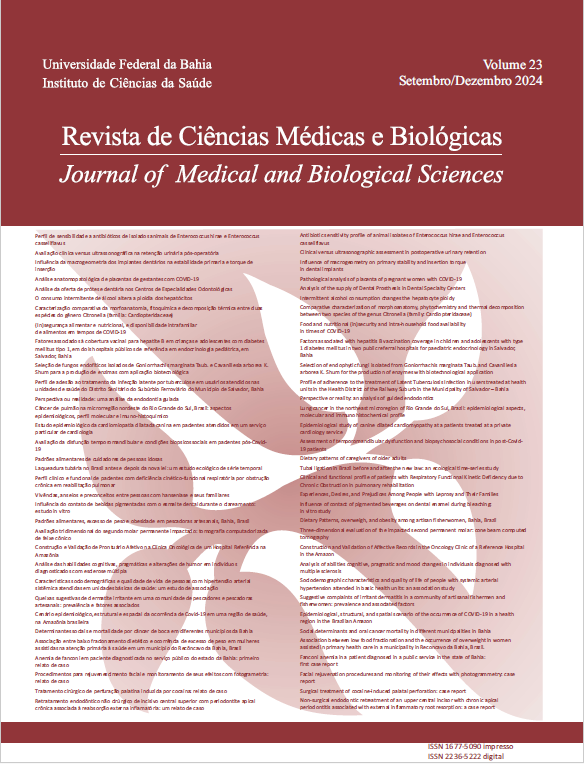Perfil clínico e funcional dos pacientes com Deficiência Cinético Funcional Respiratória por Obstrução Crônica em reabilitação pulmonar
Clinical and functional profile of patients with Respiratory Functional Kinetic Deficiency
DOI:
https://doi.org/10.9771/cmbio.v23i3.56721Palavras-chave:
Classificação Internacional de Funcionalidade, Incapacidade e Saúde, Fisioterapia, Tolerância ao ExercícioResumo
Objetivo: Descrever o Perfil clínico e funcional dos pacientes com Deficiência Cinético Funcional Respiratória por Obstrução Crônica em reabilitação pulmonar. Métodos: Trata-se de um estudo transversal, de caráter descritivo, e com base em dados secundários coletados dos prontuários dos pacientes atendidos pelo serviço de fisioterapia no período de agosto de 2014 a agosto de 2019. Assim, dados relacionados ao Teste De Caminhada De Seis Minutos (TC6), relação Volume Expiratório Forçado no 1° segundo sobre a Capacidade Vital Forçada (VEF1/CVF), Pressão Inspiratória Máxima (PImáx), Pressão Expiratória Máxima (PEmáx) e escala de dispneia Medical Research Council modificada (mMRC), foram coletados. Foram incluídos todos os pacientes admitidos no período supracitado sem restrição de idade ou gênero e diagnóstico de deficiência do sistema respiratório excluídos os prontuários com dados. Resultados: O estudo analisou o prontuário de 57 pacientes, dos quais 30 foram do gênero masculino (52,63 %) e a idade média foi 65,59 ± 16,1 anos. O diagnóstico Fisioterapêutico com maior prevalência foi o de Deficiência Cinético Funcional Respiratória por Obstrução Crônica (DCFROC) grau GOLD 2 e os percentuais de comprometimento funcional, pela CIF, foram principalmente entre 25-65%. Conclusão: Com base nos achados conclui-se que o perfil dos pacientes estudados foram idosos de ambos os sexos, com diagnóstico de DCFROC moderado e comprometimento funcional de moderado a grave pela CIF.
Downloads
Downloads
Publicado
Como Citar
Edição
Seção
Licença
Copyright (c) 2024 Revista de Ciências Médicas e Biológicas

Este trabalho está licenciado sob uma licença Creative Commons Attribution 4.0 International License.
A Revista de Ciências Médicas e Biológicas reserva-se todos os direitos autorais dos trabalhos publicados, inclusive de tradução, permitindo, entretanto, a sua posterior reprodução como transcrição, com a devida citação de fonte. O periódico tem acesso livre e gratuito.






